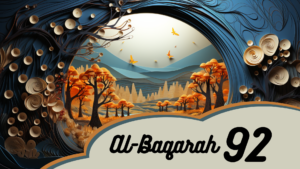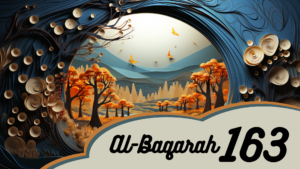In this article, we uncover the profound meaning behind Verse 35 of Surah Al-Baqarah. With a focus on explaining the significance and application in the daily lives of Muslims, we delve into the depths of this verse to shed light on its spiritual wisdom. By exploring the context and providing detailed explanations, we aim to deepen our understanding of this verse and its relevance to our lives as believers. Join us on this journey of discovery as we unlock the treasures within Verse 35 of Surah Al-Baqarah.
Explanation of Verse 35 of Surah Al-Baqarah
Understanding the Context of Surah Al-Baqarah
Surah Al-Baqarah is the second and longest chapter (surah) of the Quran, the holy book of Islam. It consists of 286 verses, covering a wide range of topics including guidance for personal conduct, rules and regulations for societal interactions, stories of past prophets, and reminders about the Day of Judgment. The chapter was revealed in Medina, during a time when the Muslim community faced various challenges and needed guidance to navigate those difficulties.
Overview of Verse 35
Verse 35 of Surah Al-Baqarah is a significant verse that recounts the story of Adam and Eve in the Garden of Eden. It highlights Adam’s mistake, his repentance, and Allah’s forgiveness. The verse serves as a reminder to humanity about the consequences of disobedience and the importance of seeking Allah’s forgiveness.
Literal Translation of Verse 35
The literal translation of verse 35 is as follows:
“And We said, ‘O Adam, dwell, you and your wife, in Paradise and eat therefrom in [ease and] abundance from wherever you will. But do not approach this tree, lest you be among the wrongdoers.'”
This translation emphasizes the initial commandment given to Adam and Eve to reside in Paradise and enjoy its bounties while placing a restriction on a specific tree.
The Meaning of Verse 35
Acknowledgement of Adam’s Mistake
The verse acknowledges the mistake made by Adam and Eve when they disobeyed Allah’s commandment not to approach a certain tree in Paradise. This disobedience demonstrated their vulnerability to temptation and their failure to follow Allah’s instructions. The story of Adam and Eve’s mistake serves as a reminder to all human beings that, despite our best intentions, we are prone to error and need to be cautious in our actions.
Repentance and Seeking Forgiveness
After realizing their mistake, Adam and Eve turned to Allah in sincere repentance. They recognized their wrongdoing and sought forgiveness from their Creator. This aspect of the verse highlights the importance of acknowledging our faults, taking responsibility for our actions, and seeking forgiveness from Allah. It reminds us that, no matter how grave our sins may be, Allah is always ready to forgive those who genuinely repent and seek His forgiveness.
Consequences of Adam’s Disobedience
The consequences of Adam’s disobedience are presented in the verse as a warning to humanity. Upon breaking the commandment, Adam and Eve were no longer allowed to dwell in Paradise. They were expelled from their blissful surroundings and placed on Earth as mortal beings, with all the hardships and challenges that come with it. This consequence reminds us of the gravity of disobedience and the potential negative repercussions it can have on our lives.
Significance and Application in Daily Lives
Recognition of Human Weakness
The story of Adam and Eve’s mistake, as depicted in verse 35, serves as a reminder of the inherent weakness and fallibility of human beings. It humbles us by highlighting that even the first human beings, created by Allah Himself, were prone to making mistakes. This recognition of our human limitations can foster empathy and understanding towards others who make errors. It can also serve as a reminder to be cautious in our actions, always striving to improve ourselves.
Seeking Guidance and Forgiveness from Allah
The verse emphasizes the importance of seeking guidance and forgiveness from Allah when we make mistakes or commit sins. Just as Adam and Eve turned to Allah in sincere repentance, we too should acknowledge our faults, seek Allah’s forgiveness, and strive to rectify our behaviour. This act of repentance and seeking forgiveness can bring about a sense of peace and spiritual healing, as we reconnect with our Creator and take steps towards self-improvement.
Learning from Adam’s Mistake
The story of Adam and Eve’s disobedience serves as a valuable lesson for all of humanity. It reminds us of the consequences of straying from Allah’s commandments and the importance of adhering to His guidance. By reflecting on this story, we can learn from Adam’s mistake and strive to avoid similar errors in our own lives. It encourages self-awareness, self-reflection, and continuous growth on our path towards righteousness.
In conclusion, verse 35 of Surah Al-Baqarah presents the story of Adam and Eve’s mistake and its implications. It highlights the acknowledgement of Adam’s mistake, the importance of repentance and seeking forgiveness from Allah, and the consequences of disobedience. The verse holds significance in recognizing the weakness of human beings, seeking guidance and forgiveness from Allah, and learning from past mistakes. By reflecting on this verse, Muslims can gain valuable insights and apply its teachings in their daily lives, striving to strengthen their relationship with Allah and lead a righteous path.




